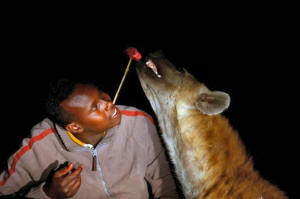|
Hyenas spark admiration, not fear, in
Ethiopia's Harar city
 Send a link to a friend
Send a link to a friend
 [July 18, 2017]
By Tiksa Nagari [July 18, 2017]
By Tiksa Nagari
HARAR, Ethiopia (Reuters) - Hyenas roam the
streets of the ancient walled city of Harar in eastern Ethiopia every
night, seeking scraps of meat to drag to the nearby caves.
But residents are not afraid. A family chosen by the town to feed the
animals is not daunted by the task despite the dangers that are
associated with coming into close quarters with such wild animals.
Abbas Yusuf, known as Hyena Man, learnt to feed the hyenas from his
father, Yusuf Mume Salleh, who fed them for 45 years before passing the
job to his son 13 years ago.
"Hyenas have never attacked the people of Harar after my father started
feeding them, unless you harm their babies," Abbas Yusuf told Reuters.

"My father is always thankful that I continued the good work he started
and I will pass it onto my children when I grow old."
His work is now an attraction, drawing in tourists who came to see the
city's ancient mosques nestled within its old stone walls.
"I am privileged by God to be a good friend to those misunderstood
animals," he said.
"I have a baby hyena in my house and keep it in my bedroom (and I'm) not
worried it will bite me when I sleep."
Abbas has given the hyenas names according to their behavior and
appearance. Among them are "Dabbassoo" or "Hairy", "Tuqan Dilii" or
"Lazy", and "Qallaa", meaning "skinny".
To encourage visitors to trust the hyenas, Abbas feeds them directly
from his mouth.
The hyenas live in caves outside the city and roam the rubbish dumps,
also outside the walls. Some hyenas give birth in the ditches in the
middle of the city.
[to top of second column] |

Abbas Yusuf, 23, known as Hyena Man, feeds a hyena on the outskirts
of the walled city of Harar, Ethiopia, February 23, 2017.
REUTERS/Tiksa Negeri

"The hyenas are a gift of nature to clean up the city we mess during
the day time. Without them the city will be much dirtier," Anisa
Mohammed, a 32-year old bread vendor, said.
Harar, with a population of 240,000 people, started to expand out of
its original wall after 1882 and is now surrounded by modern
buildings.
It has been a center of Islamic culture since it was founded in the
7th century. In the 16th century Emir Nur Ibn Mujahid built a
four-meter-high protective wall around the city, pierced by five
gates.
Every year since the 16th century, to mark the birth of Prophet
Mohammed, the city's residents offer the hyenas porridge mixed with
butter and goat meat on the "Hakim Mountain", outside the city,
believed to be a holy site because the ancient Muslim leaders of the
city are buried there.
If the hyenas refuse the sacrifice, people believe the country will
have bad luck.
For a Reuters photo essay, click: http://reut.rs/2uuygKY
(Writing by George Obulutsa,; editing by Katharine Houreld and
Pritha Sarkar)
[© 2017 Thomson Reuters. All rights
reserved.]
Copyright 2017 Reuters. All rights reserved. This material may not be published,
broadcast, rewritten or redistributed.

 |